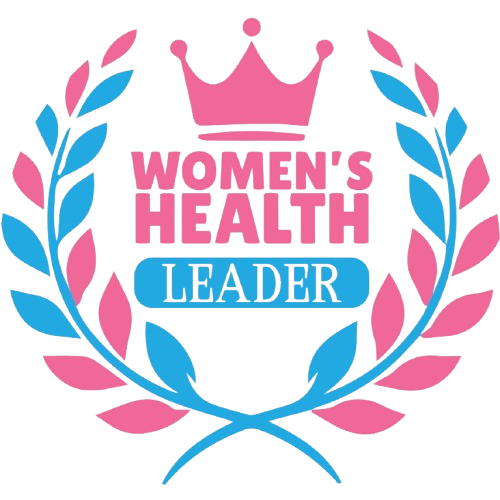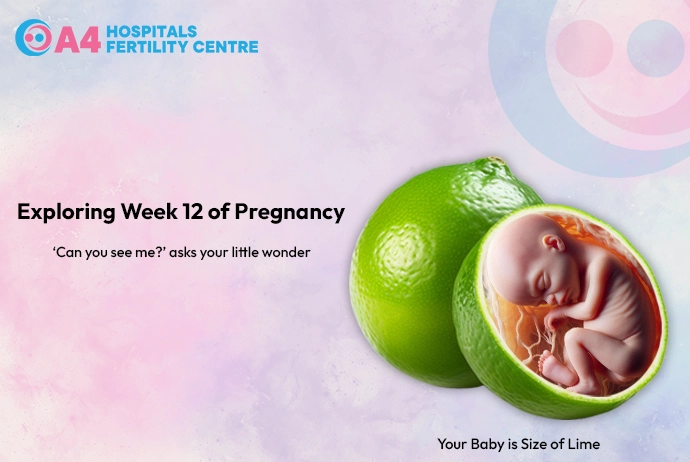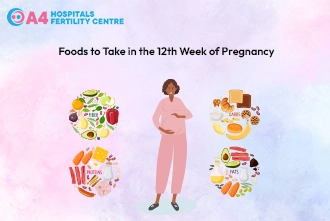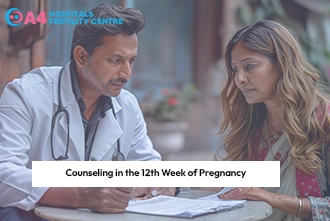
Dr. Aruna Ashok MBBS, MS OG, DNB OG
- Clinical Director


At 12 weeks, your baby is now about the size of a lime, measuring around 2 inches long and weighing about half an ounce. This tiny wonder has been growing rapidly, and many incredible changes have taken place.
Your baby's face is becoming more defined. The eyes, which started out on the sides of the head, are now moving to the front. The ears are taking their final shape, and the mouth, complete with a forming palate, is opening and closing. If you could take a peek inside, you might see your baby sucking its thumb! Tiny tooth buds are developing, and fingernails are starting to form.
Inside, the intestines, which initially grew within the umbilical cord, are now moving into the baby’s abdomen. The kidneys are beginning to excrete urine into the bladder. The nervous system is also maturing, with the brain rapidly growing and new synapses forming every minute. Your baby is beginning to move around, though you won't feel these movements yet.
The most exciting development at this stage is the formation of reflexes. Your little one can curl their fingers, make sucking movements, and if prodded, may squirm in response. These early reflexes are a crucial part of development, preparing your baby for life outside the womb.
As you marvel at the life growing within you, remember that every flutter and change is a testament to the amazing journey of pregnancy. It’s a magical time, filled with wonder and anticipation. Have you started talking to your little one? Many parents find it a beautiful way to bond, even this early on.


By the 12th week, many of the early pregnancy symptoms may start to fade, but some might persist or new ones might appear. Understanding these symptoms can help you navigate this exciting yet challenging time.
You may notice a boost in your energy levels as you enter the second trimester. The fatigue that marked the early weeks often diminishes, giving you a much-needed break. However, some women still feel tired, so listen to your body and rest when needed.
Morning sickness, which includes nausea and vomiting, may begin to ease. If you're still experiencing it, try eating small, frequent meals and avoiding triggers that make it worse. For some women, morning sickness can last longer, but there’s hope on the horizon as many feel better by the end of the first trimester.
Your breasts might continue to feel tender and swollen. This is due to the hormonal changes and increased blood flow preparing your body for breastfeeding. Wearing a comfortable, supportive bra can help alleviate some of the discomfort.
One of the more surprising symptoms can be increased saliva production, known as ptyalism. It is not harmful. But it can be annoying. Chewing gum or sucking on hard candy can help manage this.
You might also experience skin changes. The "pregnancy glow" is real for many women, thanks to increased blood circulation and hormonal changes. However, some might notice darkening of the skin, especially around the nipples, inner thighs, and neck. This condition, known as melasma or chloasma, is temporary and usually fades after pregnancy.
Emotional changes are also common. Hormonal fluctuations can cause mood swings, making you feel elated one moment and teary-eyed the next. It's important to communicate your feelings with your partner or a trusted friend. If you feel overwhelmed, consider seeking support from a counselor.
A4 Fertility Centre offers comprehensive birthing classes that cover physical and emotional changes during pregnancy. These classes can provide you with the knowledge and support you need to manage symptoms and enjoy a healthy pregnancy journey.
Do you have any specific symptoms that are concerning you? Let's dive deeper and explore ways to make your pregnancy as comfortable as possible.
Eating a balanced diet is crucial for both your health and your baby’s development. At 12 weeks, your nutritional needs are paramount, and understanding what to eat can make a significant difference.
Focus on including a mix of food that are rich in essential nutrients. Lean proteins like chicken, fish, and tofu are vital for your baby’s growth. They provide the building blocks necessary for the development of muscles, organs, and tissues.
Iron is another important nutrient at this stage. It helps prevent anemia. It is common during pregnancy. Add iron-rich foods such as spinach, lentils, and lean red meat in your diet. The combination of these items with vitamin C-rich foods like oranges and bell peppers can enhance iron absorption.
Folic acid is a good option during pregnancy as it helps prevent neural tube defects. You can find folic acid in leafy green vegetables, citrus fruits, and fortified cereals. If you're taking a prenatal vitamin, it likely contains the recommended amount, but it's still good to get folic acid from food sources.
Calcium aids the growth of your baby’s bones and teeth. The addition of dairy products such as milk, cheese, and yogurt are recommended. If you're lactose intolerant, consider fortified plant-based milk or supplements.
Don’t forget about omega-3 fatty acids, which are important for brain and eye development. Fatty fish like salmon and flaxseeds are good sources. Aim for at least two servings of fish per week, but avoid high-mercury fish like swordfish and mackerel.
Hydration is equally important. To stay hydrated, drink plenty of water throughout the day . It helps with digestion and keeps your energy levels up. Limit caffeinated beverages and avoid alcohol completely.
A4 Fertility Centre’s birthing classes offer personalized nutritional advice and meal planning tips to ensure you’re getting the right nutrients. These classes can guide you on creating a balanced diet tailored to your needs.
What are your favorite foods during pregnancy? Let’s explore some delicious and nutritious recipes that will benefit you and your baby.
Counseling during pregnancy can provide invaluable support, helping you navigate the physical and emotional changes you’re experiencing. At 12 weeks, it’s an excellent time to consider professional counseling or support groups.
Counseling can help address any anxiety or stress you may be feeling. Pregnancy is a time of significant change, and it’s normal to feel overwhelmed. A counselor can provide techniques to manage stress and promote relaxation.
If you have concerns about your pregnancy, discussing them with a counselor can be beneficial. They can provide information and reassurance, helping you feel more confident about the journey ahead. Whether it's worries about labor, body image, or parenting, having a professional to talk to can make a big difference.
Relationship counseling can also be helpful. Pregnancy can put a strain on relationships as both partners adjust to impending parenthood. A counselor can help you and your partner communicate effectively, ensuring you support each other during this time.
Support groups offer a sense of community. Connecting with other pregnant women can provide comfort and a sense of camaraderie. Sharing experiences and advice can help you feel less alone and more understood.
A4 Fertility Centre’s birthing classes include counseling sessions designed to support you emotionally and mentally. These sessions cover various topics, from managing pregnancy symptoms to preparing for labor and delivery. They provide a safe space to express your concerns and learn coping strategies.
Have you considered any counseling or support groups? It might be a good idea to explore the options available and find the support that works best for you.
At 12 weeks, several important tests can provide valuable information about your health and your baby’s development. Understanding these tests can help you make informed decisions and ensure a healthy pregnancy.
One of the primary tests at this stage is the first-trimester combined screening. This test assesses the risk of chromosomal abnormalities such as Down syndrome. It includes a blood test and an ultrasound to measure the nuchal translucency (the fluid at the back of the baby’s neck). The results, combined with your age and other factors, provide an estimate of the risk.
Another important test is the non-invasive prenatal test (NIPT). This blood test analyzes fetal DNA in the mother’s blood to detect chromosomal conditions. It’s highly accurate and can be done as early as 10 weeks. It’s especially recommended for women at higher risk of genetic conditions.
A routine blood test will check for anemia, blood type, and Rh factor. It also screens for infections such as HIV, hepatitis B, and syphilis. These tests ensure that any potential issues can be addressed early.
The ultrasound at 12 weeks is a milestone. It’s often the first time you’ll see your baby moving. The ultrasound can confirm your due date, check for multiple pregnancies, and assess your baby’s growth and development. Seeing your baby on the screen can be a magical moment, making the pregnancy feel more real.
A urine test will check for urinary tract infections, which can be common during pregnancy. It also measures protein and sugar levels, which can indicate conditions like preeclampsia or gestational diabetes.
A4 Fertility Centre offers comprehensive prenatal care, including all necessary tests and screenings. Their expert team of obstetricians and gynecologists ensures that every expectant mother receives personalized and attentive care tailored to her specific needs. They provide a full range of diagnostic tests, from routine blood work and ultrasounds to specialized screenings like the first-trimester combined screening and non-invasive prenatal test (NIPT). These tests are essential for monitoring the health and development of your baby and identifying any potential issues early on.
In addition to medical care, A4 Fertility Centre’s birthing classes are a valuable resource for pregnant women. These classes provide detailed information about what to expect during each test and how to prepare for them, alleviating any anxiety you might have. Knowledgeable instructors walk you through the purpose of each test, the procedures involved, and how to interpret the results. They also offer practical tips on managing any discomfort and ensuring a smooth testing process.
Understanding these tests and screenings can help you feel more confident and reassured about your pregnancy journey. With the support of A4 Fertility Centre, you’ll be well-informed and prepared, enabling you to focus on the joyous aspects of expecting a new addition to your family.
Do you have any questions about these tests? Let’s discuss how they can benefit you and your baby, ensuring a healthy and safe pregnancy journey.